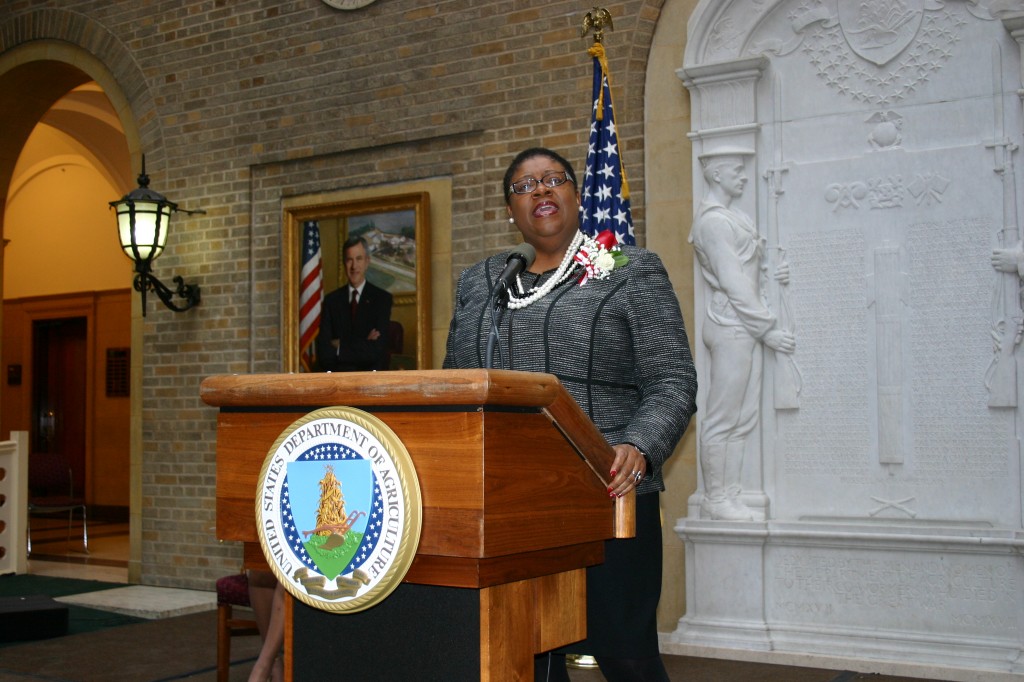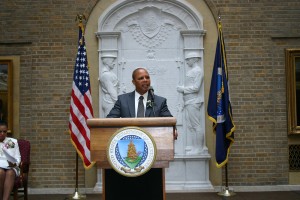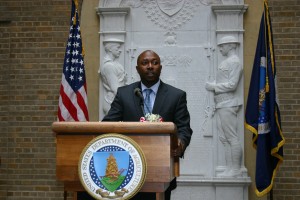
Arlean Leland said education, a mentor and volunteering for assignments are major ways to advance a career.
They weren’t supposed to scrub floors, live off of food stamps or become sharecroppers. To their parents, they were a hopeful generation of overcomers.
“I remember my mom always saying, Arlean you can do better than I can. I want you to get your education,” said Arlean Leland, associate counsel for Civil Rights and the second highest ranking African-American attorney in the U.S. Department of Agriculture. “Education is the key.”
Leland was one of three high-level African-Americans in USDA to discuss her struggles and successes of during the 2013 FSA Black History Month Observance held Feb. 28 at USDA headquarters in Washington, D.C. Following the theme “At the Crossroads of Freedom and Equality,” more than 100 people attended the event that also celebrated 150 years of the Emancipation Proclamation and the 50th anniversary of the March on Washington.
“I remember having to go to the back of Sunny’s café where I ordered that fried fish sandwich and get my fish sandwich from the backside door rather than going to the front, and my grandmother was cooking in the kitchen,” said Leland, a Mississippi native.
She said it wasn’t easy being one of three black children in an elementary school that had 800 students and it wasn’t easy when she had to fight to be valedictorian of her high school class.
“But you have got to dig down and say I’m going to make things happen. Only you can write your history and write your story,” she said, adding that education, a mentor and volunteering for assignments no one else wants are essential for moving one’s career forward. “In order to progress on the job, you must be ready to do work when you come to work.”
Leland said she is annoyed when employees walk around the hallways with pink fluffy house shoes and wearing glitter tops as if they left the night club and came straight to work. “We have got to present ourselves in such a way that people want us to lead them,” she said. “You need to dress for the job that you aspire to.”
That’s how Mark Rucker, deputy administrator for Management sees it. The grandson of a sharecropper, Rucker grew up in the projects in New York and spent summers in South Carolina on his grandparent’s farm.
“I owe it to my ancestors and the sacrifices they made to continue to achieve higher goals while still maintaining my identity,” said Rucker. “The earliest memory of my mother was seeing her on her hands and knees scrubbing floors. I saw her go back to school, graduate from college and work for the federal government as a postal worker. I had a sense of obligation that when I got 18 years old it was time to do something for myself.”
He joined the military and after more than 20 years, he retired and worked a short stint in the private sector before coming to USDA, as the director for Logistics and Facility Division of the Food and Nutrition Service (FNS), and now FSA.
“When I told my mother I was going to work for FNS she was very surprised because we used to be those kids who received food stamps,” he said. “She told me, ‘boy you have come full circle.’”
Rucker attributes some of his best qualities to the summers working on his grandparent’s farm. It taught him how to work hard and achieve more.
“If you look beyond the traditional obstacles and believe in yourself and believe in your ideas and take advantage of the opportunities given to you, then you can be successful,” said Rucker. “I’m living proof of that.”
Karis Gutter, deputy undersecretary for Farm and Foreign Agricultural Services, echoed those words, saying as a child he learned that he needed to get a good education and then “run as far and as fast from the farm as you can.”
A native of Mississippi, Gutter traced his history back as far as his great-great-great-great- grandmother, and said his father was the first to have a career that wasn’t tied to the farm. “So I didn’t have to endure a number of the challenges, and they didn’t have to endure some of the challenges [associated with farming].”
Yet, he said during the civil rights era, his family was a group of fighters who also took care of their families. “They paved just as big of a path by doing the right thing at home and making sure the family structure was intact.”
That path also led Gutter to back into agriculture and into FSA as a young deputy undersecretary under the age of 40. He then moved to become a senior advisor to the Agriculture Secretary before assuming his current position.
Gutter said that even today the Farm Service Agency is making history, mentioning an initiative that Agriculture Secretary Tom Vilsack will announce in the coming days to help diversify committees that serve as a link between farmers and USDA.
“We are still making strides for civil rights in FSA,” said Gutter. “We are setting and making history. It doesn’t matter if you are in DAFO [deputy administrator for field operations] or making policy, you all are playing a role to make sure that all programs are made available to everyone.” View photos of the event.







